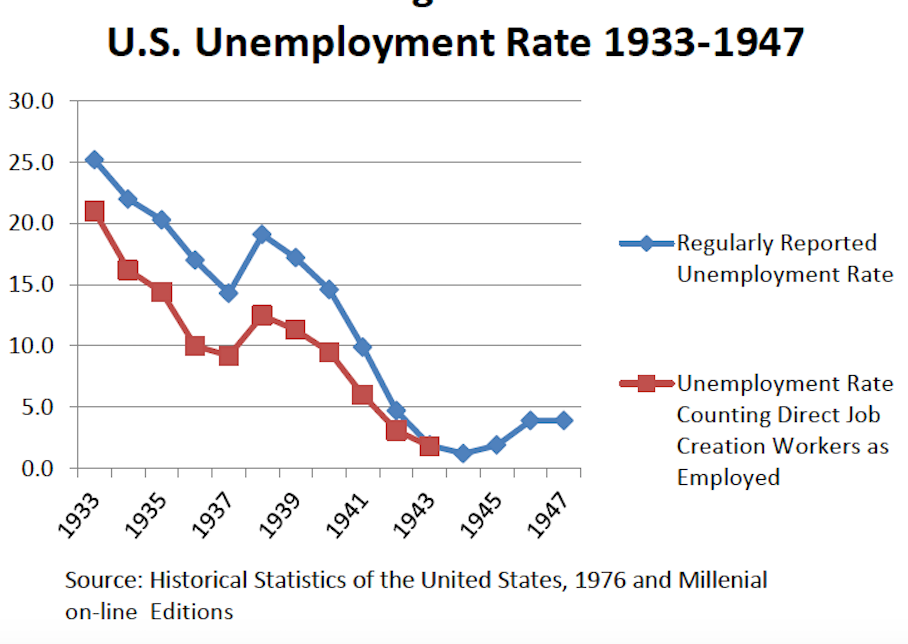Three Myths About Unemployment
History has disproven them. Biden must reject them.
As a new administration prepares to grapple with the economic crisis caused by COVID-19, three myths about unemployment continue to muddle the thinking in Washington about how to help unemployed American workers.
Myth 1: Federal job creation did little to end unemployment during the Great Depression.
Fact: The CCC, CWA, WPA and other job-stimulating programs cut the unemployment rate in half. Early measures treated workers in New Deal jobs programs as unemployed; thus, the “official” unemployment rate after 1933 remained artificially high. In fact these workers were clearly employed, often doing tough physical labor. Once counted as employed, the true unemployment from 1933-1937 dropped sharply well before the U.S. beefed up its military spending in late 1939 and then entered World War II.
Fact: There is almost always a job shortage. When Franklin Delano Roosevelt (FDR), Harry Hopkins, Frances Perkins, Henry Wallace, Harold Ickes and other New Dealers began work in 1933, they had no trouble grasping the giant job shortage even though unemployment data was in its infancy and job opening data was unborn. Today, we have solid survey data on both fronts. Since 2000, the U.S. Bureau of Labor Statistics (BLS) has collected data on both the unemployed (using different definitions) and job openings. Sure enough, there are more job seekers than job vacancies most of the time. A job shortage is the norm. Sometimes it’s modest. Often, it’s big. Today it’s huge. Private industry can rarely absorb all job seekers.
Creating subsidized jobs is the best way to correct this persistent shortfall in the labor market.
Myth 3: The only problem we must solve is unemployment.
Fact: Employment is the foundation of economic security: work for wages is how most Americans survive. Yet a job is only the start. Wages must be high enough so that — combined with earning supplements like the Earned Income Tax Credit (EITC) and Child Tax Credit (CTC) — full-time work provides enough income for individuals and families to enjoy a decent living standard. There should be no such category in the U.S. as “the working poor.”
FDR and his New Deal team understood this. That’s why, in addition to creating millions of federally subsidized jobs to compensate for a horribly shrunken labor market, they worked for legislation that set a minimum wage (Fair Labor Standards Act) and encouraged collective bargaining (National Labor Relations Act).
FDR and his fellow New Dealers did not let myths about unemployment deter them from laying a foundation of economic security for tens of millions of Americans. With few models to build on, they took quick, bold and experimental action to improve workers’ economic lives. Their work resulted in more jobs, higher wages and health insurance, even before the U.S. entered into a war economy.
Unfortunately after WWII, the myth that New Deal jobs programs did little to wind down the Great Depression began to gain a foothold among policymakers. Older myths also reappeared. The unemployed were bums; the poor were lazy; their personal flaws explained their plight in our land of endless opportunity. This outdated view of poverty dangerously hindered the thinking of a new generation of policymakers.
Exposing these myths, we hope, will help the Biden administration think clearly about what it takes to create economic security in the 21st century.
Like Lincoln, Biden must “disenthrall” us from failed dogmas and guide us to “think anew, and act anew.” His administration and its congressional supporters must reject the myths about unemployment that block the path to economic security for all. They must push for a federal policy that offers subsidized jobs to all adults who cannot be absorbed into the regular labor market. That policy, combined with a higher minimum wage, bigger earning supplement, stronger unions, paid leave and other measures, will ensure that all Americans enjoy a decent standard of living.
This column was originally published on The Hill.
David Riemer is a senior advisor on the Workforce for Social Security Works and author of “Putting Government In Its Place: The Case for a New Deal 3.0.”
Dr. June Hopkins is the granddaughter of Harry Hopkins, professor emerita at Georgia Southern University, Armstrong Campus, and author of “Harry Hopkins: Sudden Hero, Brash Reformer.”
Op-Ed
-
Wisconsin Candidates Decry Money in Politics, Plan to Raise Tons of It
 Dec 15th, 2025 by Ruth Conniff
Dec 15th, 2025 by Ruth Conniff
-
Trump Left Contraceptives to Rot; Women Pay the Price
 Dec 8th, 2025 by Dr. Shefaali Sharma
Dec 8th, 2025 by Dr. Shefaali Sharma
-
Why the Common Council’s Amended Budget is Good Policy for Milwaukee
 Nov 20th, 2025 by Alds. Marina Dimitrijevic and Russell W. Stamper, II
Nov 20th, 2025 by Alds. Marina Dimitrijevic and Russell W. Stamper, II





















